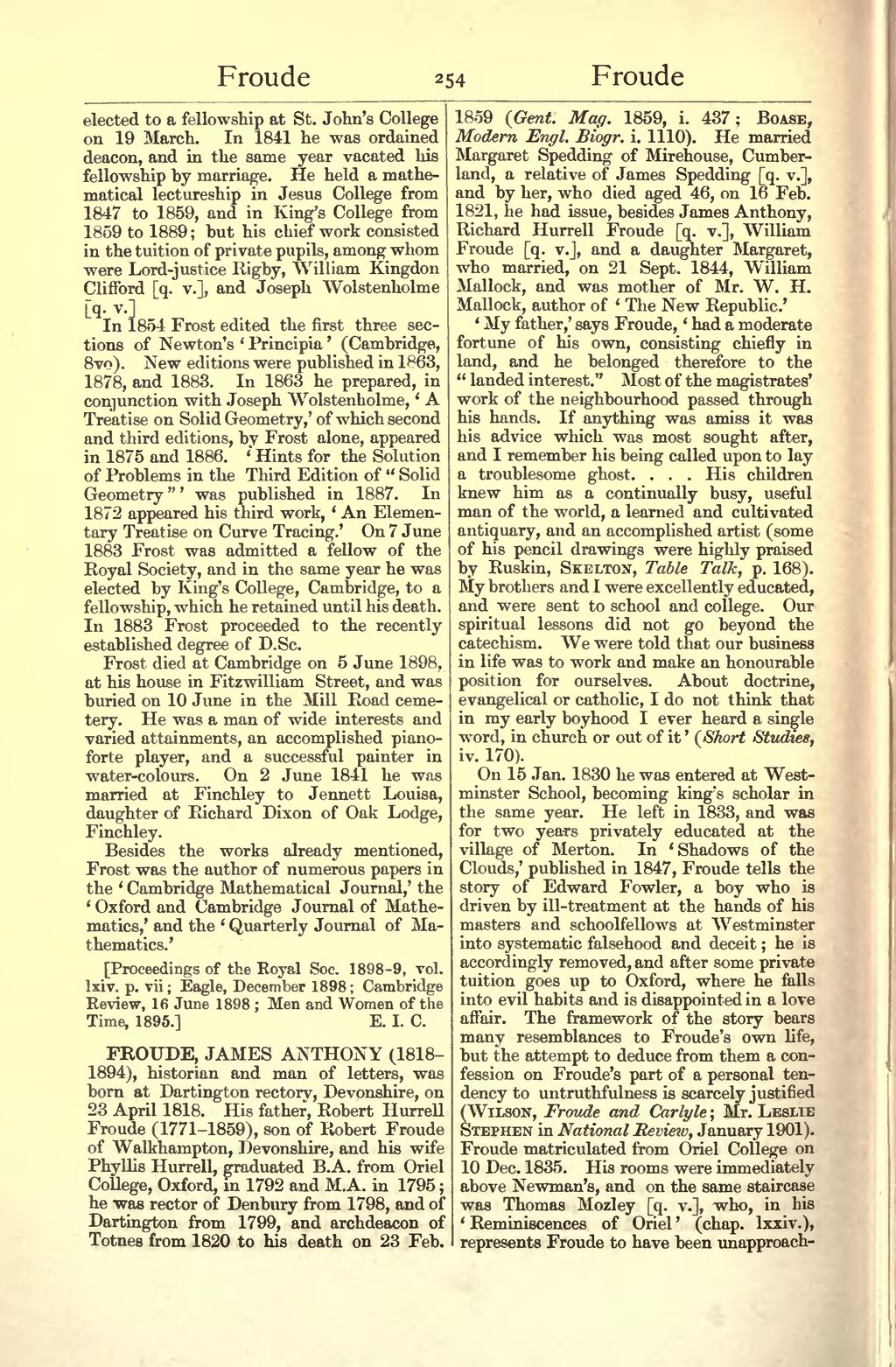elected to a fellowship at St. John's College on 19 March. In 1841 he was ordained deacon, and in the same year vacated his fellowship by marriage. He held a mathematical lectureship in Jesus College from 1847 to 1859, and in King's College from 1859 to 1889; but his chief work consisted in the tuition of private pupils, among whom were Lord-justice Rigby, William Kingdon Clifford [q. v.], and Joseph Wolstenholme [q. v.]
In 1854 Frost edited the first three sections of Newton's ‘Principia’ (Cambridge, 8vo). New editions were published in 1863, 1878, and 1883. In 1863 he prepared, in conjunction with Joseph Wolstenholme, ‘A Treatise on Solid Geometry,’ of which second and third editions, by Frost alone, appeared in 1875 and 1886. ‘Hints for the Solution of Problems in the Third Edition of “Solid Geometry”’ was published in 1887. In 1872 appeared his third work, ‘An Elementary Treatise on Curve Tracing.’ On 7 June 1883 Frost was admitted a fellow of the Royal Society, and in the same year he was elected by King's College, Cambridge, to a fellowship, which he retained until his death. In 1883 Frost proceeded to the recently established degree of D.Sc.
Frost died at Cambridge on 5 June 1898, at his house in Fitzwilliam Street, and was buried on 10 June in the Mill Road cemetery. He was a man of wide interests and varied attainments, an accomplished pianoforte player, and a successful painter in water-colours. On 2 June 1841 he was married at Finchley to Jennett Louisa, daughter of Richard Dixon of Oak Lodge, Finchley.
Besides the works already mentioned, Frost was the author of numerous papers in the ‘Cambridge Mathematical Journal,’ the ‘Oxford and Cambridge Journal of Mathematics,’ and the ‘Quarterly Journal of Mathematics.’
[Proceedings of the Royal Soc. 1898–9, vol. lxiv. p. vii; Eagle, December 1898; Cambridge Review, 16 June 1898; Men and Women of the Time, 1895.]
FROUDE, JAMES ANTHONY (1818–1894), historian and man of letters, was born at Dartington rectory, Devonshire, on 23 April 1818. His father, Robert Hurrell Froude (1771-1859), son of Robert Froude of Walkhampton, Devonshire, and his wife Phyllis Hurrell, graduated B.A. from Oriel College, Oxford, in 1792 and M.A. in 1795; he was rector of Denbury from 1798, and of Dartington from 1799, and archdeacon of Totnes from 1820 to his death on 23 Feb. 1859 (Gent. Mag. 1859, i. 437; Boase, Modern Engl. Biogr. i. 1110). He married Margaret Spedding of Mirehouse, Cumberland, a relative of James Spedding [q. v.], and by her, who died aged 46, on 16 Feb. 1821, he had issue, besides James Anthony, Richard Hurrell Froude [q. v.], William Froude [q. v.], and a daughter Margaret, who married, on 21 Sept. 1844, William Mallock, and was mother of Mr. W. H. Mallock, author of ‘The New Republic.’
‘My father,’ says Froude, ‘had a moderate fortune of his own, consisting chiefly in land, and he belonged therefore to the “landed interest.” Most of the magistrates' work of the neighbourhood passed through his hands. If anything was amiss it was his advice which was most sought after, and I remember his being called upon to lay a troublesome ghost. … His children knew him as a continually busy, useful man of the world, a learned and cultivated antiquary, and an accomplished artist (some of his pencil drawings were highly praised by Ruskin, Skelton, Table Talk, p. 168). My brothers and I were excellently educated, and were sent to school and college. Our spiritual lessons did not go beyond the catechism. We were told that our business in life was to work and make an honourable position for ourselves. About doctrine, evangelical or catholic, I do not think that in my early boyhood I ever heard a single word, in church or out of it’ (Short Studies, iv. 170).
On 15 Jan. 1830 he was entered at Westminster School, becoming king's scholar in the same year. He left in 1833, and was for two years privately educated at the village of Merton. In ‘Shadows of the Clouds,’ published in 1847, Froude tells the story of Edward Fowler, a boy who is driven by ill-treatment at the hands of his masters and schoolfellows at Westminster into systematic falsehood and deceit; he is accordingly removed, and after some private tuition goes up to Oxford, where he falls into evil habits and is disappointed in a love affair. The framework of the story bears many resemblances to Froude's own life, but the attempt to deduce from them a confession on Froude's part of a personal tendency to untruthfulness is scarcely justified (Wilson, Froude and Carlyle; Mr. Leslie Stephen in National Review, January 1901). Froude matriculated from Oriel College on 10 Dec. 1835. His rooms were immediately above Newman's, and on the same staircase was Thomas Mozley [q. v.], who, in his ‘Reminiscences of Oriel’ (chap. lxxiv.), represents Froude to have been unapproach-

